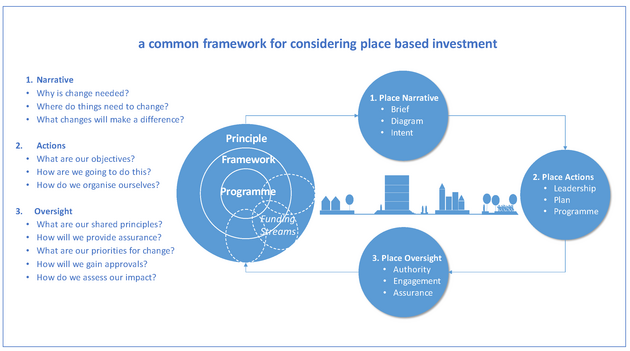The Place Based Framework
Why do we need a Place Framework?
Place is important. It has shaped who we are and frames what we become. Having a real say about what happens to our place empowers who we are and who we can be. Place is a useful and relatable way to understand and implement change. It is a key driver of our fundamental wellbeing and a bridge between national policies and local action.
Our objective is for collaboration to be an everyday reality in Scotland’s towns, villages, and neighbourhoods. For each place to be successful in its own way, with local resources targeted at the most relevant outcomes with the most impact. This is an expression of localism in action. It engages with lived experiences and local opportunities and it helps develop a shared purpose and a will to act, pulling together scattered resources for shared outcomes.
But investment in places can be fragmented, leading to fewer benefits for the people who live there. Typical approaches do not always address the bigger picture, and this needs to change.
Three key tools to deliver this change are:
- The Place Principle: Adopted by Scottish Government and COSLA, commits to a joined-up, inclusive, and collaborative approach across all sectors in a place.
- The Place Based Framework: All major spending programmes should be taking a place-based approach. The framework is one means of helping to ensure alignment between these programmes.
- The Place Based Investment Programme: A significant five year programme of coordinated place based investments.
Purpose and Ambition
The Place Based Framework provides a challenge to the assumptions we make about places. And it does this by asking straightforward questions before we decide what to do, and what to stop doing. Our ambition in a nutshell is to nurture places across Scotland where authentic narratives drive coordinated programmes with collaborative oversight - changing the circumstances, and the surroundings, of people’s lives.
 Place Based Framework Diagram: a common framework for considering place based investment
Place Based Framework Diagram: a common framework for considering place based investment
What is the Place Framework?
The Framework proposes that: before investing in a place you first need to establish a common story, a shared way forward, and a sensible governance structure. It therefore asks decision makers to consider a series of basic questions designed to understand: the fundamental Narrative of a place, the reasons why it needs to change and what its future should be; how separate Actions will dovetail into an overall programme for change; and how collective Oversight will be sustained.
1. Place Narrative
Every place is already subject to a bunch of policies across most areas of people’s lives. A place-based approach does not seek to hijack these priorities. But, it does seek to ensure that they are delivered in the best way possible for each place. This requires a real understanding of local circumstances - the joined-up context for standalone interventions.
The Place Narrative responds to simple key questions in order to develop three useful outputs:
- A Brief which describes the nature of each place with its own criteria for success
- A Diagram of the most relevant geography of needs, assets and activities
- A clear statement of Intent with the changes needed to make a difference
How these questions are considered, and at what level of detail, will depend on the characteristics of each place. It is not about an additional level of bureaucracy. It is about prompting a useful and helpful conversation with the people who truly know a place.
2. Place Actions
Delivering many changes in a place requires a programme approach. This involves:
- Conditions for Success which reflect a leadership commitment from partners and stakeholders
- A Route Map that deals with the core questions and sets out how to make things happens
- A Basis for Action which identifies a compelling case for change and a credible pathway to delivery
We need to underpin our place-based aspirations with credible business cases that attract funding, and with implementation plans that are feasible.
3. Place Oversight
The decision-making and funding landscape is really complex. To make sense of this at a local level requires a forum for voices to be heard and a focus for decision making. To sustain a common purpose and to deliver a shared programme over a long period will need local collective leadership. Who drives this will depend on local context. But for this local oversight to be effective it needs to provide:
- An Authorising Environment which has the support and trust of partners.
- A Stakeholder Engagement process which is transparent and well managed.
- Policy Assurance that what is being done is for the right reasons, and in the right way, with the right outcomes.
At the heart of this oversight is the adoption of agreed principles within a clear delivery process. One which dovetails the needs of stakeholders with the needs of the place.